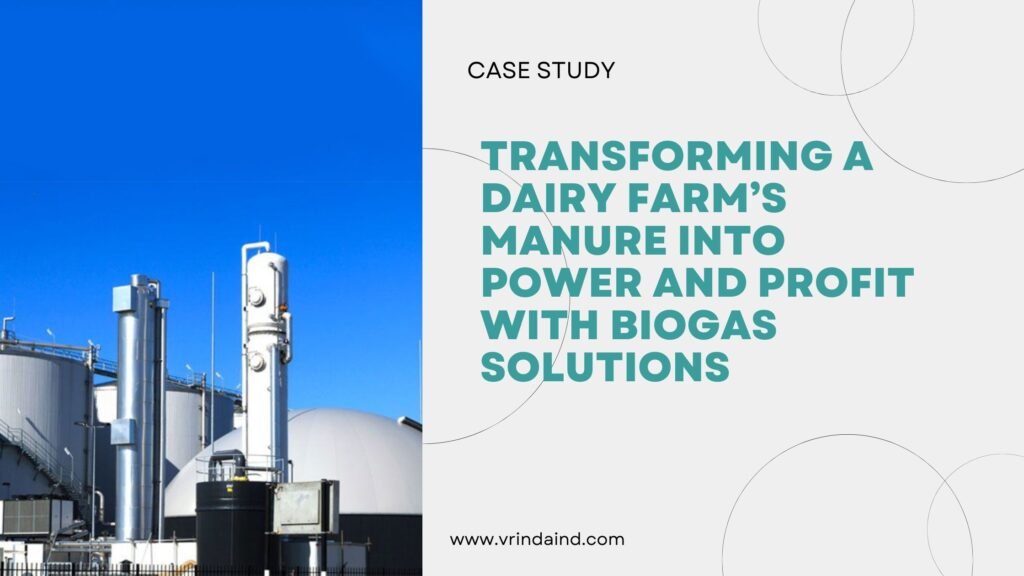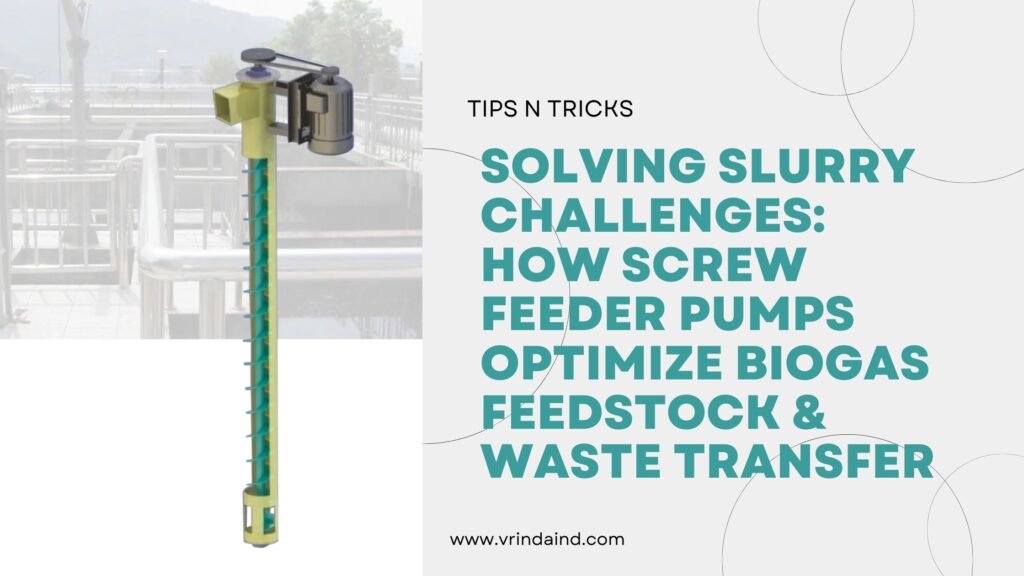In modern agriculture, large-scale dairy farms face an immense challenge: managing high volumes of animal manure. Historically, this has meant costly disposal, odors, and significant greenhouse gas (GHG) emissions from manure lagoons. Today, innovative technology offers a powerful alternative, turning this environmental liability into a sustainable source of energy and revenue.
At Vrinda Industries, we specialize in providing tailored biogas solutions to solve such complex organic waste management problems. This case study details how a large dairy farm successfully integrated our specialized biogas plant equipment to achieve complete resource recovery and operational sustainability.
The Challenge: Manure, Methane, and Mounting Costs
Our client, a large dairy operation with over 2,500 head of cattle, was grappling with several persistent challenges:
Massive Manure Volume: Daily, they generated hundreds of tons of manure, requiring expensive hauling and lagoon storage.
Methane Emissions: The stored manure was decomposing and releasing methane, contributing significantly to the farm’s carbon footprint and neighborhood odors.
High Operating Costs: The farm incurred substantial annual costs for electricity to run milking parlors and feed systems, as well as for purchasing chemical fertilizers for their fields.
Regulatory Pressure: The farm faced increasing pressure to comply with strict environmental regulations regarding nutrient runoff and air quality.
The farm needed a turnkey biogas solution that could efficiently handle their unique, high-solids feedstock while providing a tangible financial return.
The Vrinda Industries Solution: Engineered for Manure Management
Vrinda Industries designed and supplied the core biogas plant equipment tailored for the farm’s specific manure volume and characteristics. The solution involved a continuous-feed, mesophilic anaerobic digester system:
Feedstock Preparation & Pumping: We integrated robust Screw Feeder Pumps (similar to our reliable Roto Screw Pumps) at the manure reception pit. These specialized pumps ensure the consistent and precise transfer of the thick, high-solids manure slurry into the digester, preventing blockages and optimizing feedstock input.
Optimal Digestion & Mixing: Inside the massive digester, we installed multiple High Flow Agitators (custom-sized based on the digester volume). These agitators ensure the manure slurry is constantly homogenized, preventing sedimentation, distributing heat evenly, and maximizing contact between the bacteria and the feedstock, thereby ensuring peak biogas yield.
Energy Recovery: The captured biogas is piped to a Combined Heat and Power (CHP) unit, which converts the gas into electricity for the farm’s consumption and heat for maintaining the digester’s optimal temperature.
Resource Recovery (Digestate Management): Following digestion, the effluent is passed through our Solids-Liquid Separators for Digestate. This process separates the material into stackable, virtually odorless solid bedding/fertilizer and a nutrient-rich liquid effluent for irrigation.
Tangible Results: From Waste Stream to Revenue Stream
The implementation of the Vrinda Industries biogas solution delivered immediate and substantial results across environmental, economic, and operational fronts:
| Area of Impact | Before Biogas Implementation | After Biogas Implementation |
| Manure Fate | Lagoon storage, high GHG emissions | Controlled digestion, methane captured |
| Electricity | X annual cost (grid power) | Self-sufficient, Y annual revenue from surplus power |
| Fertilizer | Z annual cost (chemical fertilizers) | Zero chemical fertilizer purchase, using valuable bio-digestate |
| Methane Emissions | High (Uncontrolled) | Near Zero (Captured and utilized) |
| Odor Control | Significant odor issue | Odor drastically reduced |
Key Takeaways:
100% Energy Independence: The farm achieved complete self-sufficiency in electricity and heat, plus generating a surplus for sale.
GHG Reduction: The capture of methane eliminated the farm’s primary source of greenhouse gas emissions, significantly improving their carbon footprint.
Closed-Loop Resource Recovery: They successfully replaced costly chemical fertilizers with their own digestate, turning manure into a direct cost-saving asset.
Operational Reliability: The quality and durability of the specialized biogas equipment ensured smooth, continuous operation with minimal downtime.
Conclusion: Sustainable Agriculture is Profitable
This case study is a powerful illustration that environmental stewardship and economic growth are not mutually exclusive. By utilizing robust and specialized biogas plant equipment from an experienced manufacturer like Vrinda Industries, the dairy farm not only solved its complex organic waste management problem but also created a reliable new revenue stream and established itself as a leader in sustainable agriculture.

Contact Vrinda Industries today to discuss how our customized biogas solutions and high-performance equipment can deliver similar success for you!




